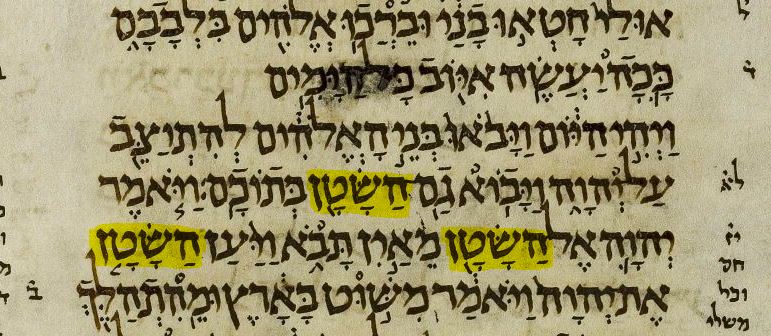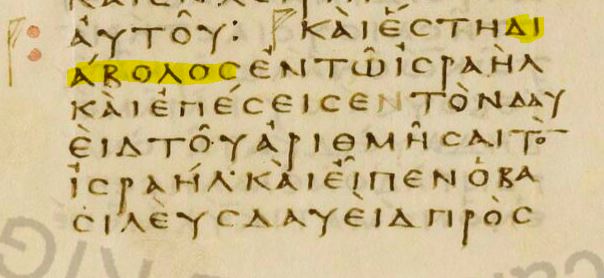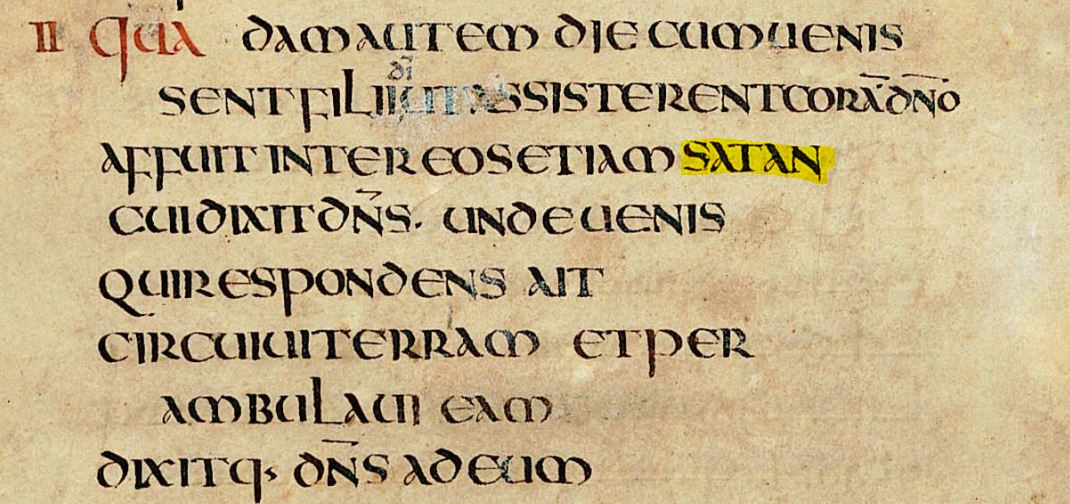1/ "Satan": Thread
Why do we translate Job 1:6 et al "Satan" as a personal name/noun (Aleppo Codex below: hasatan; השׂטן)? Hebrew does not articulate proper nouns, since they are already considered definite. The Hebrew is better rendered "the Accuser/Opponent."
Why do we translate Job 1:6 et al "Satan" as a personal name/noun (Aleppo Codex below: hasatan; השׂטן)? Hebrew does not articulate proper nouns, since they are already considered definite. The Hebrew is better rendered "the Accuser/Opponent."
2/ Now, the use of the article here and elsewhere is still significant regardless how we translate it. The article could signal a unique referent like "the sun" (השׁמשׁ) or perhaps it is marking a common noun as a proper noun היאר the River = the Nile River (Van der Merwe et al).
3/ The definite article here is important because Job has introduced a group "the sons of God" (members of the heavenly council/angels/demons etc.) and wants to indicate that also "the satan" was among them. But what is the precise sense of "the" here?
4/ With the article, the author transforms the common noun "satan" to indicate "the (well-known) Satan/Accuser", but the definite article should be translated and the personal name Satan should not be read. "The Accuser" was a well-known member of the heavenly council.
5/ Only once does the word refer to this heavenly figure without the article and thus a personal/proper name is intended: 1 Chronicles 21:1, שׂטן (Satan). Chron was one of the final books written. Development of "the Adversary">Satan was underway. But the Old Greek translation...
6/ ...of Job 1:6 renders hasatan ὁ διάβολος "the accuser" as he does elsewhere in the Prologue, and other Greek translators like 1 Chronicles 21 follow this pattern...
7/ ...but with a significant difference: there is no article in Greek so that it matches the Hebrew construction perfectly. Here, we still have a translation of שׂטן Satan with "accuser" but lack of article may indicate a further development in the understanding of this figure...
8/ ...as a proper noun.
Still, the remains of the #Hexapla add knowledge. The Jewish interpretation in Greek at least in the late Second Temple wasn& #39;t unified. Theodotion (1st cen) at Job 1:6 renders השׂטן "the Accuser" with ἀντικείμενος "Opponent" w/out article, perhaps...
Still, the remains of the #Hexapla add knowledge. The Jewish interpretation in Greek at least in the late Second Temple wasn& #39;t unified. Theodotion (1st cen) at Job 1:6 renders השׂטן "the Accuser" with ἀντικείμενος "Opponent" w/out article, perhaps...
9/ ...indicating that he too understood the Hebrew construction (hasatan/"the satan") as transforming a common noun into a proper noun, but Theodotion still translates the noun, leaving Aquila to take the final step.
10/ Aquila (ca. 130 AD) was the first translator to translate finally the Hebrew of Job 1:6 with σατάν "satan," which is probably intended to be a proper noun and personal name in Greek.
11/ Of course, the New Testament uses σατανας/σαταν as well. For the most part, the term applies to the same heavenly figure (Matt. 4:10) but even Jesus will use it to refer to Peter as satan "opponent" (Matt 16:23), perhaps indicating "satan" is still not a personal name.
12/ Ultimately, our English translations have Satan at Job 1:6 et al. because Jerome& #39;s Latin Vulgate used it (image: Codex Amiatinus). Jerome probably knew of Aquila& #39;s σατάν and employed it in his translation as he was revising the Old Latin version (diabolus).
13/ So how should we translate hasatan in Job 1:6 et al.? Why not "the Adversary" (or similar so now we know what "satan" means) in Job with a footnote indicating that this Adversary is the well-known one who becomes named Satan later on?
14/ Even in Job, "the Adversary" takes on many guises: "Leviathan" (3:8), Yam & Tannin (7:12), "Sea" (9:8; 38:8-11), Rahab (9:13; 26:12), and "the gliding serpent" (26:13), culminating in the final "Leviathan" at the end of the book.
What do we lose and/or gain in doing this?
What do we lose and/or gain in doing this?
. @WillKynes and @Dom_S_Hernandez, how do you all teach this complicated issue? Feel free to tell me "I& #39;m way off!" :)

 Read on Twitter
Read on Twitter








